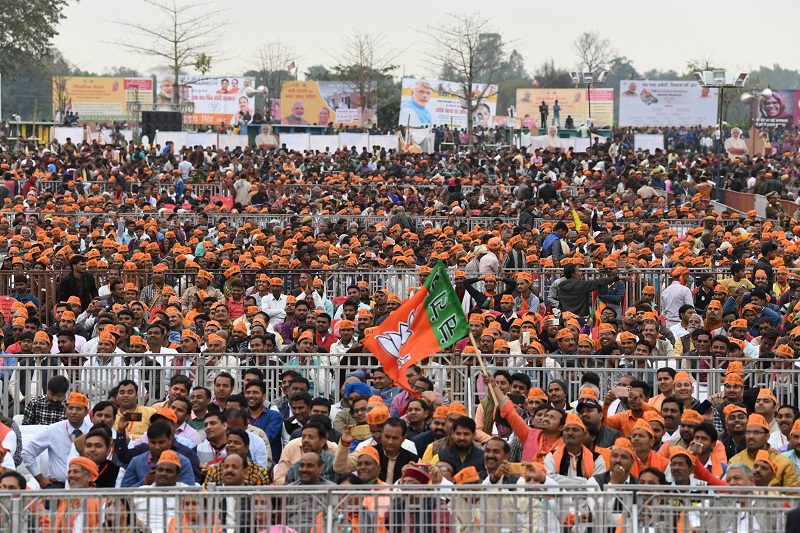The impact of the Kashmir crisis on the Indian election

‘Ye humara siddhant hai ki hum ghar mai ghus kar maarenge … Main lamba intezaar nahi kar sakta.’ (It is our principle to hit enemies inside their territory … I don’t like to wait for long.)
These words, spoken by Indian Prime Minister Narendra Modi during a visit to Ahmedabad this week, show clear parallels to a famous dialogue in a recently released Bollywood movie based on the 2016 ‘surgical strikes’ ordered by the Modi government to eliminate terrorists in Pakistan-controlled Kashmir.
Modi invoked this emotive language just days after India conducted airstrikes against Pakistan, which led to a major skirmish along the ‘line of control’ (the de facto border between the two countries in Kashmir). While the details of what exactly happened remain murky, and the question of whether India’s airstrikes were successful is being hotly debated, it’s undeniable that India’s retaliation (framed as ‘pre-emptive non-military action’) after the Pulwama terrorist attack has provided a strong impetus to Modi’s Hindu-nationalist Bharatiya Janata Party’s bid for the upcoming Indian election.
A few hours after the airstrikes, government sources reportedly claimed that the terrorist camp in Balakot, which is inside Pakistan, had been destroyed and several hundred terrorists had been killed. However, satellite imagery has raised doubts about these claims. Nonetheless, there seems to be a consensus that Modi’s decision to authorise cross-border airstrikes marks a drastic shift from the previous Indian policy of restraint with regard to Pakistan’s continued support for terror outfits, shown in its response to the 26/11 Mumbai terrorist attacks and during the 1999 Kargil War (when prime minister Atal Bihari Vajpayee refused to allow Indian jets to cross the international border).
The Modi government has a knack for breaking established norms of restraint and strategic patience; it authorised a covert counterterror operation in Myanmar in 2015, conducted ‘surgical strikes’ in Pakistan-controlled Kashmir in 2016, and now allegedly violated Pakistani airspace in 2019 (for the first time since the 1971 war). In each case, it moved against real threats to India’s security.
These interventions feed into the strongman narrative that Modi has built around himself—for example, his allusion, in the lead-up to the 2014, to his 56-inch chest as a metaphor for his courage and bravado. He recently inaugurated India’s first national war memorial even though, as head of government and not head of state, it wasn’t his prerogative to do so. Moreover, he used the inauguration speech to attack the Congress Party for compromising on defence over several decades after independence.
Whether the BJP’s narrative of victory and confronting Pakistan this time around will translate into electoral success remains to be seen. It’s clear, though, that India’s main opposition parties, such as the Congress Party, the Trinamul Congress, the Aam Aadmi Party, have been caught on the back foot by Modi’s latest action. They were quick to congratulate the Indian Air Force but, as details of a possible botch-up (especially after Pakistan’s counterstrikes) emerged, they took no time in blaming Modi for war-mongering for electoral gain, while trying not to be seen as criticising the Indian military. Modi, in another rally this week, exclaimed that the opposition was ‘busy with strikes’ on him as they questioned the success of the airstrikes.
It’s worth noting that none of the other political parties have yet presented any credible alternatives to Modi’s recent decisions. Nor have they outlined strong and coherent national security policies more broadly. Once, when asked what he would have done in Modi’s place during the India–China military standoffs in Doklam in 2017, Congress Party leader Rahul Gandhi replied that he didn’t know the details of what had happened despite the fact that he had criticised the Indian government’s handling of the crisis.
For months now, India’s main opposition parties (except the Congress Party), led by regional kingmaker Mamata Banerjee, have been busy stitching together a mega anti-Modi alliance, or a ‘third front’, to defeat the incumbent BJP. The Congress Party has been scrambling to accuse the BJP government of corruption in the deal to buy Rafale fighter jets from France, while at the same time trying to rebrand its image under a new leader, Priyanka Gandhi, the scion of the Nehru-Gandhi dynasty.
The BJP has been accused of watering down unemployment figures and understating the impact of its disastrous demonetisation scheme. It has also been calling out dissenters and left-wing liberals as ‘anti-nationals’ and endorsing movies that portray the government in a favourable light, especially Uri the Surgical Strike. Rousing nationalistic passions vis-à-vis Pakistan in the media usually lends electoral benefits, especially for the BJP’s Hindu-nationalist base.
Moreover, the chest-thumping that the government indulged in after the 2016 surgical strikes led to expectations that it would avenge any future attacks. There was a general outcry that seemed to paint the prime minister into a corner from which he ‘needed to act’. If the Pulwama attacks were a litmus test for Modi’s strongman image, he has arguably passed and proved what he had to: that he has the political will to escalate beyond the established thresholds of retaliation.
A week after the strikes, Indian politics is getting back to normal; the government is again being attacked for the Rafale deal with France and Modi is back to electioneering. Analysts are debating what India’s airstrikes really achieved and some are even being called ‘anti-nationals’ for asking these questions.
Modi’s jingoism and chest-thumping might seem simply political, but they do have a dangerous side—inflaming nationalistic passions and calls for military action between two nuclear-armed countries. The political battlelines for the 2019 election have been drawn and the outcome will show whether India’s nationalist wave is growing or receding. It’s not just the 1.5 billion citizens of India and Pakistan who have a stake in what happens next.